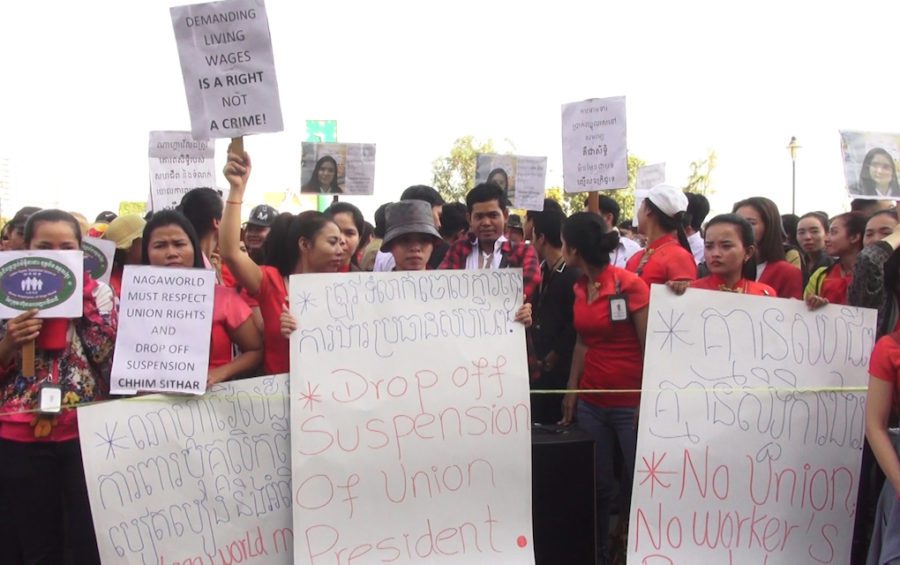NagaWorld workers and union leaders who have refused to accept termination are planning rallies and urging a strike next month, vowing to continue until the casino company’s management addresses their current and unsolved grievances.
Leaders of the casino’s union, who have all been laid off, released a letter on Monday warning that they would begin a peaceful protest with unionized employees and the workers who are contesting termination near the NagaWorld complex on December 18, noting they would continue to push a strike “until a solution is found” for 10 past and current demands.
Chhim Sithar, the leader of the union and a former casino floor worker, said the action — decided by a majority vote among terminated workers and the remaining unionized NagaWorld employees — will go beyond the five demands they brought to the Arbitration Council after the termination went into effect.
“We want the public to see how this company is repeating violations of labor rights,” she told VOD. “We also want to tell the company that no matter how long the case is left unsolved, we will not forget and we will keep looking for justice.”
The letter notes that 373 workers still have not accepted their termination by the company, and they will demand reemployment. The letter also notes that unionized and terminated workers want NagaWorld to recalculate the termination packages, saying it was not in line with Cambodian Labor Law, and ensure that terminated workers have the first shot at new jobs offered by the company for two years since their layoff, another Labor Law requirement.
Since NagaWorld reopened to casino-goers on September 15, the company began hiring IT technicians and in-house detectives, advertising an internal job opening to employed workers, according to company communications shared by Sithar and positions listed on NagaWorld’s website. Some of the laid-off workers were from the technician section, and their former tasks are still necessary and being covered by others, Sithar said based on her conversations with current employees.
“The company fired workers and said it’s because in this job they don’t need many people to do it anymore, but actually the workers from the layoff group have been pushed [into the jobs] from other departments,” she said. “They said because they don’t need their jobs anymore, but actually the work is still there.”
A NagaWorld call center employee who said her nickname was Claudia said the company had not received the notification about the strike, though Sithar said one of the union’s activists had submitted the letter to their office. VOD also sent an email with additional questions to NagaWorld’s general enquiry address, following Claudia’s instructions, but had not received a response by press time. Chief human resources officer Hein Dames could not be reached.
Sithar added that the arbitrators reviewing the case had already noted that NagaWorld’s termination pay calculations were wrong and in need of review, but they had not seemed to review them. She didn’t expect the nearly 1,000 workers who accepted their layoff package to join the strike, as they’ve “moved on” to other jobs, or are struggling to find new work.
“The main reason we fight for the correct calculation … is it [sets] a very bad example if the company does not do this [review], there’s no enforcement if the company does not comply,” she said.
The letter also references disputes between the union and the company dating back to 2009, when more than a dozen union leaders and organizers at that time were laid off — a move that the company attributed to the then financial crisis — as well as other Arbitration Council rulings about worker layoffs and compensation from 2012 and 2014.
The strikers also seek an end to the “Executive Training Program,” or a scheme that hires workers on fixed-term contracts without full benefits, as well as the termination of Florian Pastiu, a casino manager who Sithar said had overloaded workers’ schedules and verbally harassed and humiliated employees.
Sithar said the union had petitioned to hire a new casino floor manager multiple times, noting that workers lost employee benefits under his leadership, plus he took away the chairs that allowed casino floor supervisors to sit during their hourslong shifts from his first day.
“It looks like this guy is saving the company costs spent on workers’ salaries,” she said.
NagaCorp, the casino complex’s Hong Kong-listed parent company, reported that its average daily gaming revenue from the mass market casino tables for the first nine months of this year was $415,000, while average daily revenue from the VIP market was $814,000 — figures 36.6 percent and 62.4 percent lower than last year’s respective figures.













